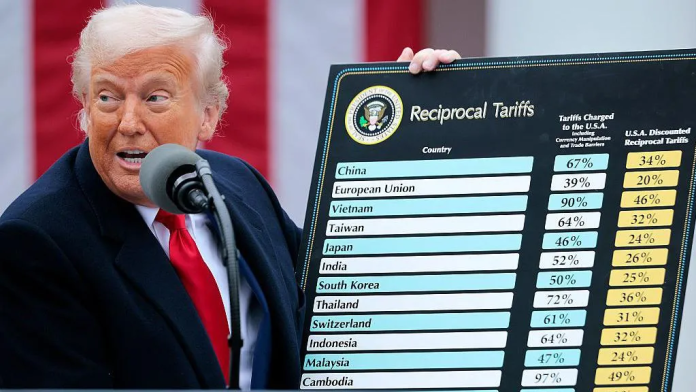US President Donald Trump’s decision to impose a 10% baseline tariff on all imports triggered fierce international backlash, with world leaders condemning the move as a dangerous escalation toward global economic instability.
While Canada and Mexico were temporarily spared from the new 10% levy, existing tariffs of up to 25% on their goods remain, further straining relations.
Europe vows retaliation
European Commission President Ursula von der Leyen led the charge, warning that Trump’s tariffs would “spiral” uncertainty and fuel protectionism.
President Trump’s announcement of universal tariffs on the whole world, including the EU, is a major blow to the world economy. […] We are already finalising a first package of countermeasures in response to tariffs on steel. And we are now preparing for further countermeasures, to protect our interests and our businesses if negotiations fail.
German Chancellor Olaf Scholz echoed her sentiment, calling the decision “fundamentally wrong” and a betrayal of the US-backed trade system that fueled postwar prosperity. France’s Prime Minister François Bayrou went further, branding the tariffs “a catastrophe for the US,” whereas President Emmanuel Macron called on major domestic industries to suspend planned investments in the United States.
If the response to the tariffs just imposed by the American administration is to make immediate concessions or announce investments in order to negotiate exemptions, that is a very bad idea. What message would it send if major European players started investing billions of euros in the American economy at a time when they are hitting us?
Manfred Weber, leader of the European Parliament’s largest party, accused Trump of “attacking fair trade out of fear.”
Italian Prime Minister Giorgia Meloni pledged to “do everything we can to work towards an agreement with the United States,” while her UK counterpart Keir Starmer stressed that “nobody wins in a trade war” and he would only sign the agreements in line with British “national interest.”
We have a fair and balanced trade relationship with the US. Negotiations on an economic prosperity deal, one that strengthens our existing trading relationship – they continue.
Spain’s Pedro Sánchez noted the tariffs made “no distinction between friends and enemies,” and Ireland’s Micheál Martin pledged to shield Irish jobs from the fallout. Swiss President Karin Keller-Sutter emphasised adherence to international law. Meanwhile, Sweden’s Ulf Kristersson urged a return to cooperation:
We don’t want growing trade barriers. We don’t want a trade war … We want to find our way back to a path of trade and cooperation together with the US, so that people in our countries can enjoy a better life.
Asia-Pacific allies express alarm
China’s Commerce Ministry denounced the tariffs as “protectionism with no winners,” vowing countermeasures, while Japan’s Prime Minister Shigeru Ishiba warned of damage to the multilateral trading system. South Korea’s acting president Han Duck-soo called the tariffs a “trade war reality,” urging to “pour all capabilities” to mitigate the crisis.
Australia’s Anthony Albanese criticised the move as “illogical” and harmful to US households.
This is not the act of a friend. Today’s decision will add to uncertainty in the global economy and it will push up costs for American households.
Meanwhile, New Zealand’s Trade Minister Todd McClay reaffirmed commitment to free trade despite the “strong” bilateral ties with Washington.
Americas and beyond
Canada’s Prime Minister Mark Carney struck a defiant tone, pledging to “fight back” with countermeasures while acknowledging preserved trade elements. Brazil’s Foreign Ministry hinted at WTO action, and Colombia’s Gustavo Petro adopted a nuanced stance, linking tariffs to job impacts.
The overwhelming consensus among leaders is that Trump’s tariffs risk triggering a destructive cycle of retaliation, with Scholz summing it up:
It’s perfectly obvious: even if Europe did nothing at all, it would lead to economic difficulties for the US. All this is basic economics that we have been able to read about in the textbooks on trade wars for 100 years.
Meanwhile, Russia avoided tariff restrictions, presumably due to the already imposed sanctions. US experts stressed that Moscow had managed to adapt to global economic and financial pressure.
Trump’s tariffs would hit the US European allies first, which would lead to a weakening of Euro-Atlantic political and defence ties. By imposing duties, the US president is allegedly seeking to drive the world into a new trade race.
